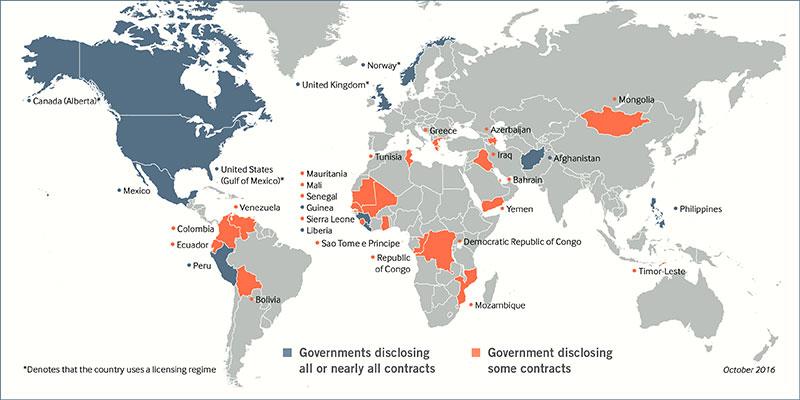
From Contract Transparency to Open Contracting in Natural Resources
Secrecy around the agreements that governments strike with extractive companies for the exploitation of natural resources is a critical issue. Without access to this information, how can interested citizens reasonably determine the impacts these projects will have on their livelihoods, their local environment, or their health? And how can they be sure that the government negotiated a decent deal on their behalf, or that the company involved is paying its taxes correctly?
An increasing number of governments recognize the import of these questions. To their credit, more than 28 governments have now published at least some of the contracts, licenses or leases that they have signed with extractives companies, and this number is growing every year, as the map below indicates. In 2016, Colombia, Tunisia and Senegal disclosed for the first time, and more countries, such as Ghana and Tanzania are expected to implement recently passed disclosure legislation soon. The private sector is also taking note and several leading companies including BHP Billiton, Kosmos Energy, Newmont, Rio Tinto, Statoil and Tullow Oil have already spoken out in support of contract disclosure.
(Click to enlarge.)These developments are encouraging, but what can governments do to fortify these gains? As discussed at the Extractive Industries Transparency Initiative (EITI) global conference in Lima earlier this year, we must look beyond the contract documents themselves to consider the long chain of events leading up to a signed deal. This includes issues such as consultation in planning, information about application and award procedures, and the release of documents associated with the contract, including annexes, addendums and related risk assessments and management plans.
The smartest and most responsive governments are now looking to open up the entire process of contract awards for a variety of reasons: to create a level playing field for investors, to ensure that information is not lost between different government bodies, to demystify the process for citizens, and to ensure relevant consultations are held and safeguards are met.
This is the concern of the open contracting movement, which has already made important progress in public procurement leading to the creation of a set of global principles agreed by governments, companies and civil society. It has also created a non-proprietary data standard for sharing contracting information throughout the entire process—the Open Contracting Data Standard. There are around 20 countries applying the standard, including Argentina, Canada, Colombia, Mexico, Paraguay, U.K., Ukraine, Vietnam and Zambia. And as more users apply the standard, the amount of comparable contracting data around the world grows, improving the ability of public officials, company employees and concerned citizens to better understand how government contracts are made and identify contracts that are fair—and those that might not be. Efforts are already underway to adapt the standard for public-private partnerships, and there is now increasing demand to translate it to the resource sector.
During the 2016 Anti-Corruption Summit in London, the governments of Ghana and Mexico made commitments to take an open contracting approach to their extractive activities, and more recently Tunisia has indicated that it will follow suit. To support these efforts, the Natural Resource Governance Institute (NRGI) and the Open Contracting Partnership have commissioned research to develop a detailed analysis of best practices for open contracting in the extractive industries. Our organizations will use this research to help progressive governments to ground decisions in an understanding of current good practice. The research should also yield a set of open contracting principles or possibly even an open contracting data standard for extractives.
At the recent International Open Data Conference, a sharing session between developers and practitioners from governments and civil society on “how to open up land and extractives contracts” revealed a number of important considerations. Discussions on ResourceContracts, a global contract repository hosting over 1,300 contracts and associated documents from 89 countries, covered the kinds of metadata that governments should release as contracts go online. Some of the most important use cases emanating from these discussions concerned how governments could better share this information among the many different agencies (cadastral, taxation, environment and finance among others) that use contract data.
Session participants also discussed the unique spatial considerations of natural resource investments. Important strides have been made through AidData’s efforts to collect and organize Liberian concessions data, for example. Through this work and building on earlier efforts of the Open Contracting Partnership and EITI, AidData is developing a geocoding specification for open contracting data to encourage and standardize the reporting of spatial data on contracts and investment activities, which allows more reliable evaluation of the effect of concessions on local economic growth.
Meanwhile discussions about the Indonesia One Map Initiative and Global Forest Watch shed important light on issues of spatial data transparency; alignment of data from different government sources; participation in the planning phase of the contract process, including environmental impact assessments and free prior and informed consent; and validation of data and data sources.
While we’re optimistic about the future of open contracting, this post only addresses part of the story. Yes, there are tens of counties who are now disclosing natural resource contracts and an open contracting approach can work to make these disclosures more meaningful and effective, but let us not forget there remain many more countries where contracts and extraction projects remain secret. We have not yet entered a world where contract transparency is taken as a given, but for those countries where it is welcome, we can take some comfort in the fact that there is a vibrant field of governments, and organizations willing to help them, dig deeper and extract more valuable information to promote better management of our natural resources.
Gavin Hayman is the executive director of the Open Contracting Partnership and Rob Pitman is a governance officer at the Natural Resource Governance Institute.
Authors


Robert Pitman
Senior Governance Officer
